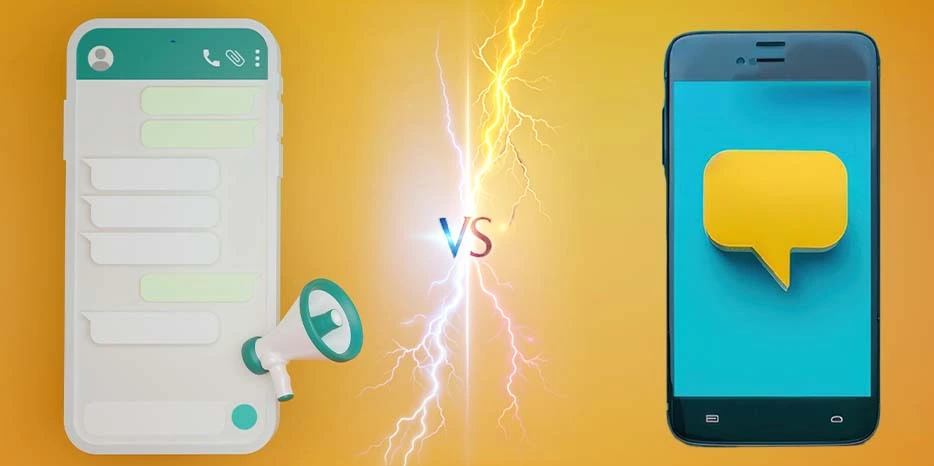- Written by: Mubeena
- November 6, 2024
Introduction
In today’s digital world, staying connected has never been easier. With various messaging platforms available, SMS and WhatsApp lead the way as two of the most widely used communication methods globally.
But which is the better choice for messaging—SMS or WhatsApp? Each has its unique benefits, drawbacks, and features.
In this article, we’ll explore the strengths and limitations of both to help you decide which platform best meets your needs.
Introduction
Overview of SMS and WhatsApp
Key Features
The Benefits and Drawbacks
Performance
Security and privacy
Cost Analysis
conclusion
Overview of SMS and WhatsApp:
SMS (Short Message Service) is a traditional text messaging service that operates over a cellular network, requiring only a mobile phone signal to function. Since its inception, SMS has been a staple for quick and reliable text communication, used by billions of people worldwide.
WhatsApp, on the other hand, is a feature-rich messaging app that leverages the internet for communication. Launched in 2009, WhatsApp has grown into one of the most popular apps globally, with over 2 billion users. It offers a wide array of features, from multimedia sharing to voice and video calls, making it more versatile than SMS.


Key Features:
When comparing SMS vs WhatsApp features, it’s essential to look at the unique capabilities each platform offers:
SMS: SMS provides a straightforward experience, limited to text and basic multimedia messages (MMS). Its simplicity and universal availability make it reliable, as it doesn’t require internet access—just a cellular signal.
WhatsApp: WhatsApp offers text, multimedia messaging, voice and video calls, group chats, location sharing, and more. It also allows for end-to-end encryption on messages, adding an extra layer of security that SMS lacks.
The feature set of WhatsApp, which includes functionalities like voice notes and file sharing, gives it an edge for users who want more than just basic text messaging.
The Benefits and Drawbacks:
Both SMS and WhatsApp have pros and cons that influence how users choose to communicate.
Benefits of SMS:
Reliability: SMS works in areas with limited or no internet, making it more accessible for users in rural or remote regions.
Universal Compatibility: SMS is available on all mobile phones without requiring the installation of any apps or special permissions.
Drawbacks of SMS:
Limited Features: The lack of support for multimedia content and internet-based features in SMS limits user interaction.
Lack of Security: Unlike WhatsApp, SMS does not have end-to-end encryption, making it vulnerable to security threats.
Benefits of WhatsApp:
Rich Features: WhatsApp offers a wide variety of communication methods beyond text, including multimedia, voice, and video, catering to different needs.
End-to-End Encryption: WhatsApp ensures data security and privacy, making it more secure than SMS for sensitive communications.
Drawbacks of WhatsApp:
Internet Dependence: WhatsApp requires an internet connection, which can be a limitation in areas with weak or no connectivity.
Not Universally Accessible: Unlike SMS, WhatsApp is a smartphone-based app and isn’t supported on basic mobile phones.
Performance:
In terms of performance, the comparison between SMS and WhatsApp reveals distinct advantages and limitations.
Delivery Speed: SMS generally offers instant delivery as long as there is a cellular connection. WhatsApp also provides quick delivery but depends on internet speed and connectivity, which can be inconsistent in some regions.
User Experience: People often perceive SMS as simpler and more direct for basic communication needs. However, for a richer, multimedia-enhanced experience, WhatsApp’s diverse features make it more engaging and interactive. The WhatsApp vs. SMS user experience largely depends on individual needs—SMS for simplicity and reliability and WhatsApp for feature-rich, modern interactions.
Security and privacy:
In today’s data-driven world, SMS vs WhatsApp security is a critical consideration. SMS, unfortunately, lacks encryption, making it vulnerable to interception.
WhatsApp, however, offers end-to-end encryption, ensuring that only the sender and receiver can access message content.
This encryption is a considerable advantage for users prioritizing privacy and security, positioning WhatsApp as the safer choice between the two platforms.
Cost Analysis:
The cost analysis of SMS versus WhatsApp is another crucial factor.
SMS: Many carriers offer unlimited SMS within specific regions, but international SMS can be costly. For business bulk SMS campaigns, there may be additional charges.
WhatsApp: WhatsApp operates over the internet, allowing free communication as long as the user has an active internet connection. However, data usage costs may apply, especially for multimedia sharing and video calls.
For businesses with international reach, WhatsApp provides a more cost-effective way to communicate, particularly where SMS rates can be high.
Conclusion
The messaging app showdown between SMS and WhatsApp illustrates that each platform serves unique purposes. SMS offers unparalleled reliability and accessibility, making it ideal for straightforward communication, especially in regions with limited internet access. On the other hand, WhatsApp excels in feature-rich, secure, and interactive messaging, catering to users who require more than just basic texting.
The decision between WhatsApp and SMS communication ultimately depends on personal or professional requirements. SMS is best for simple, universal access, while WhatsApp is perfect for dynamic, multimedia interactions. With both options serving their unique niches, SMS and WhatsApp continue to coexist, each offering valuable benefits in the digital messaging landscape.

